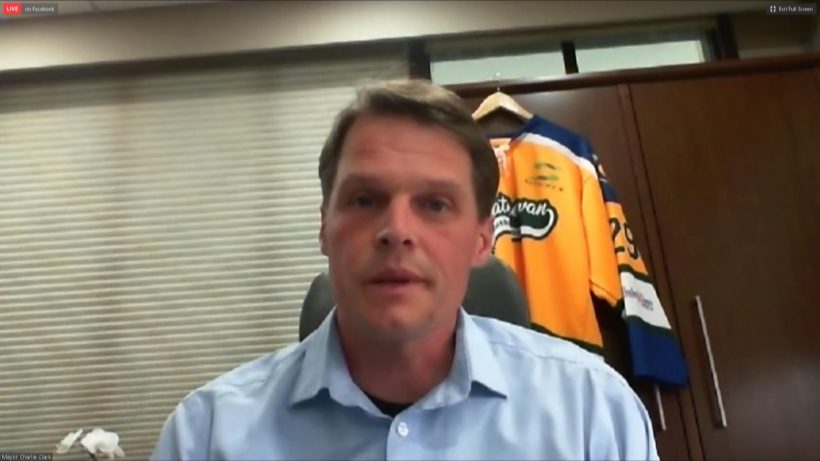The Government of Saskatchewan needs to act faster to help Saskatoon’s homeless and vulnerable populations amid the COVID-19 pandemic, according to the city.

“This is a matter of hours, not days,” said Mayor Charlie Clark during a virtual press conference Wednesday afternoon.
Clark is calling on the province to make creating a plan to help this population their top priority.
“We are lacking action,” he said.
“We are lacking clear and adequate funding commitments and the implementation of easily accessible systems to help house the homeless, to help provide testing and food and the supports to people who are vulnerable.”
On Monday, Clark sent a letter to Premier Scott Moe calling for a number of initiatives. They are:
- Block funding for shelters, which is based on the shelter’s maximum capacity, even if it is not operating at full capacity
- Support for First Nations agencies who are helping 25,000 members of the province’s “urban First Nation” population
- Housing the city’s homeless in hotels with a hotel-based shelter service, along with supports for clients such as mental health and addictions services
- Streamline processes to make it easier for people to access social services
Clark said front-line agencies are reporting people coming to community service hubs with COVID-like symptoms.

Get weekly health news
“Right now there is not a clear testing mechanism, and there’s no clear processes for how to ensure they can be provided a safe place to shelter and the right services in place to keep them off the streets or from overwhelming the health system.”
Clark said he wants testing sites at COVID-19 service hubs so people can be checked right away.
With layoffs and economic uncertainty during the pandemic, Clark said more people in Saskatoon are finding themselves homeless or in need of social services.
People experiencing homelessness are disproportionately impacted by large scale emergencies or disasters, according to Pamela Goulden-McLeod, director of Saskatoon’s Emergency Management Organization.
“They can’t quarantine within the shelter, that puts the rest of the shelter at risk,” she said.
“Typically they don’t have access to a place they can go or if they go someplace they are going to spread those COVID-like symptoms further into our community.”
The Saskatchewan government announced new measures on Tuesday to strengthen the province’s social services amid the pandemic. The province is providing one-time funding of $171,000 to relieve the pressure some emergency shelters are experiencing.
That’s a “band-aid” solution, Clark said. He wants to see more investments in helping people experiencing homelessness, which in turn he says will help an already busy health care system.
Clark said he has spoken with the provincial government about his letter, but said they are still lacking a clear plan.
Questions about COVID-19? Here are some things you need to know:
Health officials caution against all international travel. Returning travellers across Canada are legally obligated to self-isolate for 14 days, beginning March 26, in case they develop symptoms and to prevent spreading the virus to others. In Saskatchewan, international travellers are already required to self-isolate for 14 days upon their return to the province.
Symptoms can include fever, cough and difficulty breathing — very similar to a cold or flu. Some people can develop a more severe illness. People most at risk of this include older adults and people with severe chronic medical conditions like heart, lung or kidney disease. If you develop symptoms, contact public health authorities.
To prevent the virus from spreading, experts recommend frequent handwashing and coughing into your sleeve. They also recommend minimizing contact with others, staying home as much as possible and maintaining a distance of two metres from other people if you go out.
For full COVID-19 coverage from Global News, click here.












Comments